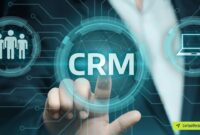Sales and Marketing Automation in the CRM (Customer Relationship Management) business refers to the use of technology to automate repetitive tasks and streamline processes related to sales and marketing. This automation helps businesses improve efficiency, increase effectiveness, and enhance customer engagement by reducing manual effort and ensuring consistent and timely communication.
Daftar Isi
Key Aspects of Sales and Marketing Automation
Here are some of the key aspects Sales and Marketing Automation:
1. Sales Automation
- Lead Management: Automates the process of capturing, tracking, and nurturing leads. This includes automatic lead scoring, assignment, and follow-up based on predefined criteria.
- Opportunity Management: Streamlines the management of sales opportunities by automating task assignments, tracking deal stages, and sending reminders for follow-up actions.
- Sales Pipeline Management: Provides tools to visualize and manage the sales pipeline, including automatic updates on deal status, forecasting, and reporting.
- Email Automation: Sends personalized and targeted emails based on customer behavior, preferences, and engagement history. This includes follow-up emails, drip campaigns, and promotional offers.
- Task and Activity Management: Automates scheduling and assignment of sales tasks, such as calls, meetings, and follow-ups, to ensure timely and organized sales activities.
- Performance Tracking: Automates the tracking of sales performance metrics, such as conversion rates, win rates, and sales quotas, to provide insights into sales team effectiveness.
2. Marketing Automation
- Campaign Management: Automates the creation, execution, and management of marketing campaigns across various channels (e.g., email, social media, and online ads). This includes setting up workflows, scheduling, and tracking campaign performance.
- Lead Nurturing: Uses automated workflows to engage and nurture leads through a series of personalized communications based on their behavior and interactions.
- Customer Segmentation: Automates the segmentation of customers based on criteria such as demographics, purchase history, and engagement levels, allowing for targeted marketing efforts.
- Social Media Management: Automates social media posting, monitoring, and engagement to maintain an active presence on social platforms and respond to customer interactions.
- Content Personalization: Delivers personalized content and offers to customers based on their preferences, behavior, and interactions with the brand.
- Analytics and Reporting: Automates the generation of marketing reports and analytics to measure the effectiveness of campaigns, track key performance indicators (KPIs), and gain insights into customer behavior.
Benefits of Sales and Marketing Automation
Here some of benefits Sales and Marketing Automation:
1. Increased Efficiency
Automation reduces the time spent on repetitive tasks, such as data entry, email follow-ups, and campaign management, allowing teams to focus on more strategic activities.
2. Improved Accuracy
By automating processes and workflows, businesses can reduce the risk of human error and ensure consistency in sales and marketing efforts.
3. Enhanced Customer Experience
Automation enables personalized and timely communication with customers, leading to a better overall experience and increased satisfaction.
4. Better Lead Management
Automated lead nurturing and scoring help prioritize high-quality leads, ensuring that sales teams focus on the most promising opportunities.
5. Increased Sales and Revenue
Streamlined sales processes, targeted marketing campaigns, and improved lead conversion rates contribute to higher sales and revenue.
6. Data-Driven Decision Making
Automation tools provide valuable insights and analytics that help businesses make informed decisions, optimize strategies, and measure the effectiveness of their efforts.
7. Scalability
Automation supports business growth by allowing sales and marketing activities to scale efficiently without a proportional increase in manual effort.
Examples of Sales and Marketing Automation Tools
Here some examples of Sales and Marketing Automation Tools:
- Salesforce: Offers extensive sales and marketing automation features, including lead management, campaign automation, and analytics.
- HubSpot: Provides an integrated CRM platform with marketing automation tools for email campaigns, lead nurturing, and social media management.
- Marketo: Focuses on marketing automation with capabilities for email marketing, lead management, and analytics.
- Pipedrive: A sales-focused CRM that offers automation features for managing sales pipelines, tracking deals, and automating follow-ups.
- Zoho CRM: Includes automation tools for sales and marketing processes, such as lead management, workflow automation, and campaign management.
In summary, Sales and Marketing Automation in CRM business involves using technology to automate repetitive and time-consuming tasks in sales and marketing, enhancing efficiency, accuracy, and effectiveness. By leveraging automation, businesses can improve customer interactions, optimize processes, and drive growth through more targeted and data-driven strategies.



